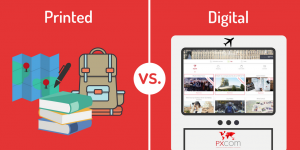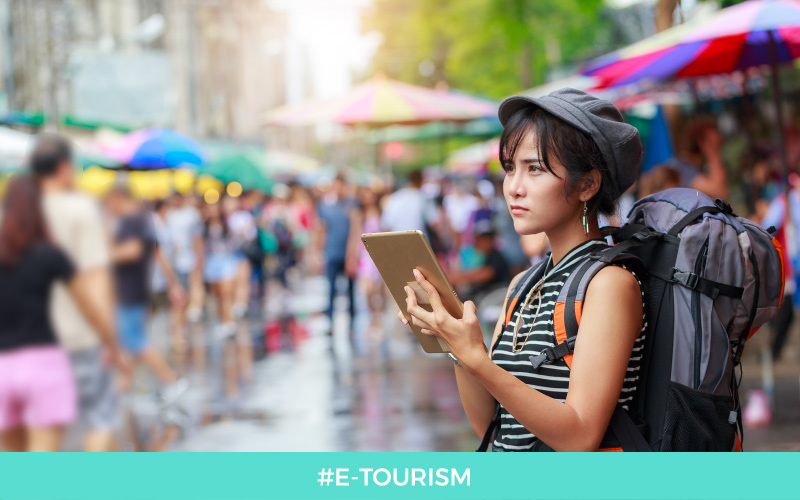Digital travel guides to change the travelers’ habits
With millions of copies sold in the World in 2017, the printed travel guides such as the Routard, Petit Futé, Lonely Planet or Fodor’s still have several bright years ahead of them. And many tourists keep whipping them out, covered with annotations, in far-off lands on Earth.
However, digital travel guides have strongly changed the travel guide industry and have profoundly modified the travelers’ habits.
How? Thanks to 5 revolutionary inputs!

Printed vs. Digital Travel Guides (with PXCom’s solution)
1st input: dematerialisation
The travel guide is now no longer only in printed version. The historical editors all offer their guides (Routard, Petit Futé, Lonely Planet, etc…) in a digital version, downloadable on an e-reader, tablet or PC, but obviously not for free. Sometimes, a part of the guide is available online for free.
2nd input : customisation
The traveler is said to only read 20% of his printed travel guide. So why not offering him a customized guide with the regions and cities he plans to visit, at a lower price? Lonely Planet and Le Petit Futé (with mypetitfute.com) took this step — their customised travel guide is downloadable and printable. Some smartphone and iPad apps, additional to the Routard and Lonely Planet (Touristeye) allow us to plan customized routes with breaks in recommended places: hotels, resturants, shops…
3rd input: intelligence
Some travel apps also integrate intelligence. In this field, the new-comers are formidable competitors. Ahead, Google with its app Trips, launched in September 2017 and free (in exchange of data access from the travelers), which allows people to gather all the tickets and bookings of their stay. Routes and stays can be selected in a rich list of tested places on Google Maps by internet users. Google Trips locates the user to offer him deals, good addresses and places to visit nearby. Another new player is mTrip, who pushes intelligence a bit further in his eponym app with a virtual reality option — once on site, you have access to information about the surrounding buildings and the distances to reach them.
4th input: the community share
Travelers who are familiar to TripAdvisor for hotels, Airbnb for private accommodations, no longer only rely on experts’ reviews (journalists, freelance journalists, food critics) to help them in the decision process. They now rely on shared reviews by internet users, regularly updated — when printed travel guides are only once a year or even every 2 years — and more authentic. The infamous editor of Fodor’s travel guide understood it — his website now has a highly-frequented forum.
5th input: the sources diversity
The ways travelers can plan their trip in advance through many different apps open new perspectives — travelers can now diversify their sources. Tourist offices’, tour-operators’ or community platforms’ websites are packed with not-to-be-missed deals and experiences!
How can tourism players take advantage of these behaviours?
When printed travel guides were dominating the industry to advice travelers, local tour-operators, rental companies, hoteliers, shopkeepers and restaurant owners didn’t have the choice as to their appearance in their pages — they had to pay, strongly communicate to the editors’ media and attract the journalists, who only visit these locals once a year.
The digital now offers them many other opportunities:
- Bookings platforms, for example, admittedly with charged registration, give a high visibility
- The « talk about me! » reflex — tourism players now need to systematically encourage their happy customers to post reviews on their platform, what Rustic Vines Tours does really well and what wonderfully works!
- The use of innovative media to promote their deals. Travelers like to vary their sources — why not catch their attention on the seatback screens of the airplanes, for example, with targeted adverts
- An easier access to specialised tourist information to enrich their company brochures or their own website. To do that, you can join Cirkwi, for example, which is an app and a community dedicated to professionals.






